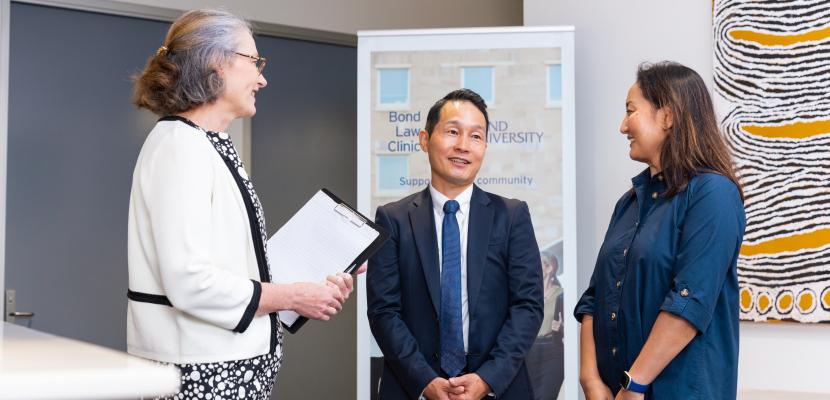
The Bond Law Clinic is proud to support the Community by providing free legal advice to community members. Proper preparation for your appointment is important to ensure that you maximize the outcome of your meeting with the Clinic.
Here are some essential steps to help you prepare for the appointment:
- Complete an Intake form: This provides us with details on your matter and who else may be involved.
- Secure your appointment: Once the Intake form is completed and submitted, you will receive an email advising of an appointment date and time if the matter is within the scope of the Bond Law Clinic’s service.
- Please ensure that you confirm this appointment within 48 hours.
- If your meeting is online, please ensure that you have internet access and log in five minutes prior to the appointed time.
- If your meeting is by phone, please ensure you are ready to receive our call at the appointed time.
- If your appointment is in person at Bond University campus, aim to arrive at least five minutes before your appointed time.
- If you need to cancel or reschedule your appointment, please ensure that this is done asap by contacting the Bond Law Clinic at [email protected].
- Think about what you would like to gain from the meeting: Each client receives one thirty-minute appointment at the Clinic, so it’s important to understand the purpose of your appointment; whether it’s seeking legal advice, discussing a legal issue or something else. This will help you frame your questions and concerns.
- Gather all relevant documents: Bring along all the relevant documents that relate to your legal matter. This may include correspondence, contracts, court documents or other important information.
- If possible, email your documents to [email protected] at least a day prior to your appointment to ensure they can be reviewed ahead of time.
- Prepare a timeline: If relevant, create a timeline outlining key events related to your legal issue. This timeline will assist the solicitor in understanding the sequence of events leading to your current situation.
- List your questions and concerns: Make a list of all questions and concerns that you want to address during the meeting to make the most of the available time.
What You Can Expect
Bond Law Clinic is supported by law student volunteers who gain invaluable practical experience working alongside the Principal Solicitor advising you in your matter.
During and after your appointment, you can expect:
- You will be meeting with the Clinic Solicitor and a student volunteer to discuss your matter.
- The Bond Law Clinic does not represent you in your matter; you will be provided with general one-off legal advice.
- After your appointment, you will be sent a Letter of Advice which will provide an overview of your discussion and recommendations on how to move forward with your matter and any other additional information or relevant research as necessary.
Car Parking
Car parking is free for Bond Law Clinic clients; however, you need to park your car in one of the Law Clinic designated carpark spaces. From there follow the signs to the Bond Law Clinic reception.
If you have any questions, please do not hesitate to contact the Bond Law Clinic by email on [email protected]